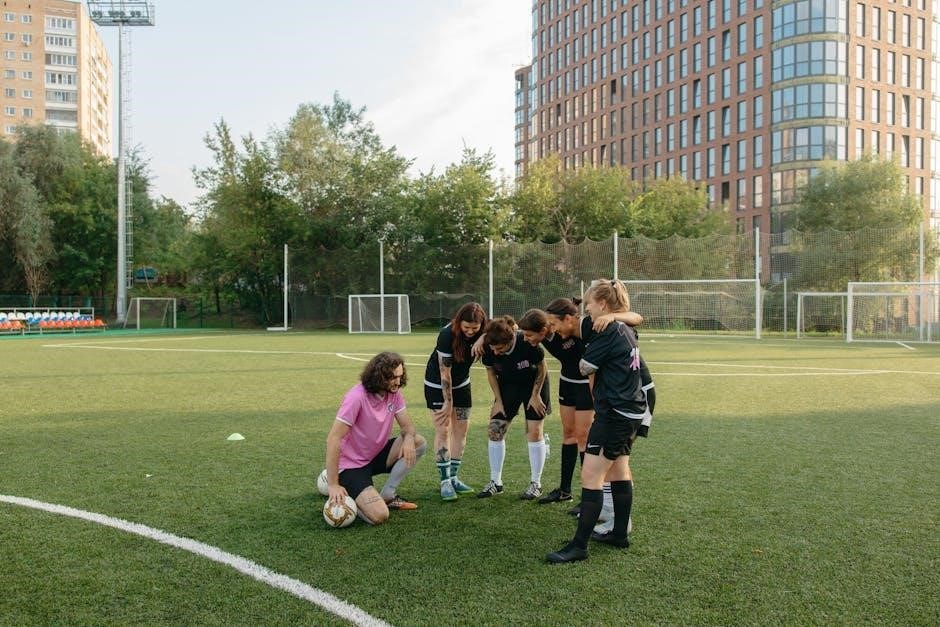Field day activities are exciting events designed to promote physical activity, teamwork, and fun for students of all ages and abilities. These engaging experiences foster camaraderie, creativity, and healthy competition, making them a memorable part of the school year. With a variety of games and challenges, field days ensure inclusive participation and lasting memories for everyone involved.
What is Field Day?
Field Day is an annual event organized by schools to provide students with a fun-filled day of physical activities, games, and challenges. It is typically held at the end of the school year, fostering teamwork, creativity, and healthy competition among participants. Designed to be inclusive, Field Day accommodates students of all ages, abilities, and interests, ensuring everyone can join in the excitement. Activities range from classic relay races and team sports to unique water-based games and cooperative challenges. The event promotes physical fitness, social interaction, and school spirit, creating lasting memories for students, teachers, and families alike. It is a celebration of movement, collaboration, and joy.
Benefits of Field Day for Students

Field Day offers numerous benefits for students, fostering physical activity, teamwork, and social interaction. It promotes healthy lifestyles by encouraging students to engage in exercise and outdoor play. Participation builds self-confidence, problem-solving skills, and emotional well-being through collaborative and competitive experiences. Field Day also enhances school spirit, creating a sense of community among students, teachers, and families. Additionally, it provides a break from academic routines, allowing students to relieve stress and recharge. Inclusive activities ensure all students can participate, regardless of their abilities, making Field Day a celebration of diversity and shared joy. These experiences contribute to holistic development, leaving students with lasting memories and a positive outlook on physical activity.
Classic Field Day Games
Classic Field Day games include relay races, tug-of-war, and the three-legged race, offering timeless fun and teamwork opportunities for students of all ages and abilities.

Team Sports and Relay Races
Team sports and relay races are cornerstone activities of Field Day, fostering collaboration and excitement among participants. Classic relay races, such as the 4×100 or the shuttle relay, encourage speed and coordination. Tug-of-war and dodgeball are popular team sports that build camaraderie and healthy competition. These activities are designed to be inclusive, allowing students of all ages and abilities to participate. Relay races often feature creative twists, like the sponge relay, where teams soak and pass sponges to fill a bucket. Such events not only promote physical activity but also teach teamwork and strategy. Whether sprinting, strategizing, or cheering, these games create lasting memories and a sense of unity among students.
Individual Challenges and Competitions
Individual challenges and competitions add a thrilling dimension to Field Day, allowing students to showcase their unique skills and determination. Activities like the straw javelin throw, where participants launch straws for distance, or water-based challenges, such as filling a bottle with a squirt gun, test precision and creativity. These events cater to diverse abilities, ensuring everyone can participate and excel. Individual competitions often include races, obstacle courses, or balancing acts, fostering personal achievement and pride. They also encourage healthy rivalry while maintaining a supportive atmosphere. Such challenges not only highlight individual talent but also contribute to the overall spirit of Field Day, making it an unforgettable experience for all involved.

Unique Field Day Activities
Unique Field Day activities offer creative twists on classic games, such as sponge races and straw javelin throws, promoting fun, creativity, and inclusive participation for all students.

Water-Based Games and Races
Water-based games and races are a refreshing way to keep students cool and engaged during Field Day. One popular activity is the sponge race, where students form lines and use large sponges to soak up water from a bucket, then race to squeeze it into another bucket. Another fun idea is the squirt gun race, where teams use squirt guns to fill cups or bottles. These activities promote teamwork, laughter, and a way to beat the heat. They are easy to organize and require minimal equipment, making them perfect for outdoor events. Water-based games ensure everyone stays hydrated and entertained, creating memorable experiences for all participants.
Cooperative Games and Group Challenges
Cooperative games and group challenges are essential for fostering teamwork and problem-solving skills during Field Day. Activities like the Seven Continents game, where students navigate obstacles representing different countries, encourage collaboration and creativity. Another engaging activity is the straw javelin throw, where teams work together to design and launch straws for distance. These games promote unity and camaraderie, as students rely on each other’s strengths to succeed. Group challenges like noodle soccer or relay races with unique twists also add excitement and teamwork. These activities are adaptable to various skill levels, ensuring all students can participate and contribute meaningfully. They create lasting memories while emphasizing the value of cooperation and mutual support.

Planning and Organizing Field Day
Effective planning involves creating detailed schedules, securing volunteers, and preparing materials. A rotation plan ensures smooth transitions between activities, while checklists and timelines help maintain organization and efficiency.

Creating a Schedule and Rotation Plan
Creating a detailed schedule and rotation plan is essential for a smooth and enjoyable Field Day. Start by allocating specific time slots for each activity, ensuring a balanced mix of games and breaks. Organize the rotation to allow participants to transition seamlessly between stations without overlap. Consider the number of students, their age groups, and abilities when assigning activity durations. Use checklists and timelines to keep track of progress and ensure all events run according to plan. A well-structured schedule helps maximize participation, minimize downtime, and guarantees a fun experience for everyone involved. Proper planning ensures the day unfolds efficiently and stress-free.

Securing Volunteers and Equipment
Securing volunteers and equipment is a critical step in organizing a successful Field Day. Start by recruiting parent and staff volunteers to help manage stations, supervise activities, and assist with setup. Create a sign-up sheet or online form to track volunteer commitments. For equipment, compile a checklist of necessary items like cones, balls, water guns, and sponges. Ensure all materials are in good condition and available in sufficient quantities. Assign volunteers to specific roles, such as activity leaders or scorekeepers, to maintain organization. A well-prepared inventory of supplies and a dedicated team of volunteers will ensure smooth execution and a enjoyable experience for all participants.

Inclusivity in Field Day
Inclusivity ensures all students, regardless of ability, participate in Field Day. Adaptive games and support structures create a welcoming environment for everyone to enjoy and succeed together.
Accommodating Students with Different Abilities
Accommodating students with different abilities ensures everyone can participate in Field Day. Adaptive games, such as wheelchair races or seated tossing activities, cater to physical needs. For visually impaired students, larger targets or sound-emitting balls can enhance participation. Cognitive impairments can be addressed with simplified rules or buddy systems. Equipment modifications, like lighter weights or oversized utensils, make challenges accessible. Teachers and volunteers are trained to support diverse needs, fostering an inclusive environment. By offering varied activities, Field Day becomes a celebration of diversity, ensuring all students feel valued and empowered to contribute. This approach promotes equality and creates lasting memories for everyone involved.
Promoting Team Spirit and Participation
Promoting team spirit and participation is central to Field Day’s success. Activities like relay races, tug-of-war, and cooperative games encourage collaboration and camaraderie. Students are divided into teams, fostering a sense of unity and shared purpose. Team names, colorful attire, and group chants further enhance team identity. Incentives like ribbons or medals motivate students to contribute their best. Emphasizing effort over competition ensures everyone feels valued, regardless of ability. Teachers and volunteers model positive reinforcement, creating an atmosphere where teamwork and support thrive. By celebrating collective achievements, Field Day builds lasting bonds and a sense of community among students, making the event enjoyable and inclusive for all participants.
Safety and Health Considerations
Safety and health are prioritized through proper supervision, equipment checks, and hydration reminders. Sunscreen and first aid are essential, ensuring a secure and enjoyable experience for all participants.
Safety Measures for Activities
Safety and health are critical components of a successful field day. Proper supervision and equipment checks ensure activities are conducted safely. Students should be reminded to stay hydrated, apply sunscreen, and wear appropriate clothing. First aid kits must be readily available, and staff should be trained in emergency procedures. Clear rules and guidelines for each activity help prevent injuries. Additionally, weather conditions should be monitored, and alternate plans prepared if necessary. Ensuring a safe environment allows students to focus on fun and participation without unnecessary risks. Open communication between organizers, volunteers, and participants further enhances safety and overall enjoyment of the event.
Health Tips for Participants
Ensuring the health and well-being of participants is essential for a successful field day. Students should stay hydrated by drinking plenty of water before, during, and after activities. Applying sunscreen and wearing hats can protect against sun exposure. Encouraging nutritious snacks and meals helps maintain energy levels throughout the day. Participants should wear appropriate footwear and clothing for physical activities to prevent injuries. Additionally, reminding students to listen to their bodies and take breaks when needed promotes overall health. Teachers and volunteers should also be prepared to assist with any medical needs. By prioritizing health, students can fully enjoy the fun and benefits of field day activities while staying safe and energized;
